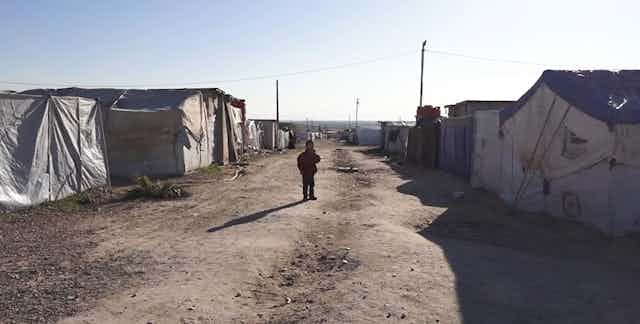Around 60 Australian women and children are reported to be living in Syrian detention camps, most of them children under six years of age. This week, the federal government announced plans to rescue these Australians – family members of slain or jailed Islamic State combatants – from the camps and repatriate them.
UNICEF says these and hundreds of other children in the camps are “critically vulnerable and in urgent need of protection”, without basics including warm clothes, hygiene, health, education and food.
The time spent in the Syrian detention camps will have affected these children differently depending on their age and stage of development. Their experiences will likely affect their lifelong health and well-being. What is needed to address the trauma experienced during their stay and the challenges they will face following repatriation? How can we help?
How they got there
In 2013, the Islamic State of Iraq and al-Sham (ISIS) (also called Islamic State in Iraq and the Levant (ISIL)) joined a rebellion against the Syrian government in the Middle East.
By mid to late 2014, they controlled a large part of Syrian and Iraqi territories. During this peak of successes in gaining territories, ISIS attracted thousands of people from around the world to come join their ranks. Reportedly, about 300 people from Australia joined ISIS and other militant groups.
In Syria, ISIS set up a government with a caliphate as the head in its control areas. Vulnerable young Muslim women were lured online from western countries to become brides of ISIS fighters. Women were promised a better future and community where they would be loved, appreciated and valued as Muslim members. But they became a commodity, sold among ISIS fighters on arrival to Syria.
In March 2019, ISIS was defeated and its government collapsed. Thousands of women and children of ISIS fighters were rounded up by the Autonomous Administration of North East Syria and placed in detention camps. In the camps, they have limited access to clean drinking water, poor hygiene, insufficient medical care and counselling, lack of schooling, and poor nutrition.

Trauma and the building blocks of adulthood
Early childhood provides the foundations for adult relationships, behaviours, health, and sociocultural outcomes such as employment and education.
Experts report children of all ages and stages in refugee camps experience a wide range of issues that can affect their ability to thrive.
Our work on migrant and refugee health, vulnerability and resilience reveals migrant youths face challenging stressors such as trauma, loss of status and social networks, lack of opportunities, cultural differences, poverty and unemployment, language difficulties and more. Depending on the support they receive and their environment, young people pass through phases of readjustment following resettlement, with outcomes ranging from integration through to marginalisation.
The Australian children in Syria will have experienced negative health outcomes under ISIS rule and afterwards in the Syrian refugee camps. They will have experienced direct or indirect violence, poor housing, disrupted schooling and malnutrition. They may have been exposed to diseases such as tuberculosis and gastrointestinal infections, and inadequate vaccination against preventable illnesses.
Long-term exposure to these conditions as children are linked to subsequent high-risk behaviours including substance and alcohol abuse. It may lead to mental health issues such as post-traumatic stress disorder, anxiety and depression. Chronic medical conditions such as heart disease, diabetes and cancer are more likely. And a broad range of social determinants of health – including poor academic outcomes and poor socioeconomic status – are also affected.
While their time in the Syrian camps will have been traumatic, their repatriation may also be disruptive and influence their health, in similar ways to other migrant groups.
The circumstances of their repatriation, alongside challenges of resettling, may come with stigma and discrimination. They will be unfamiliar with the language and culture in Australia and have uncertain legal status.
Mediation and resilience building
Despite the challenges, children have high levels of resilience and can enjoy improved health, well-being and development once in a safe, stable, supportive and nurturing environment.
Research shows children who’ve been through similar transitions are able to bounce back, express a positive outlook and high level of motivation.
To help the repatriated children thrive in Australia, we recommend interventions underpinned by a trauma-informed framework. This approach would consider different experiences endured by children under ISIS rule, while in refugee camps, on repatriation and during resettling in Australia.
The holistic approach understands the experiences of trauma from different perspectives including awareness, sensitivity, responsiveness and systemic care. Support services could include health assessment, counselling, educational support and maintaining healthy relationships with chidren’s caregivers. Helping children to establish routine can also help with readjustment. These services need to be coordinated and not siloed from one another.
Such integrated services should provide both preventative and curative care services that are culturally appropriate and respectful. Interpreting and mediation services will be needed across the spectrum of medical, emotional and social support.
Services should empower children and address stigma and discrimination. These Australians should not be referred to as “children and families of ISIS”. Their repatriation will be an opportunity for governments, schools, healthcare, community organisations and religious institutions to work together for the children’s development and wellbeing.
Read more: Refugee camps can wreak enormous environmental damages – should source countries be liable for them?

